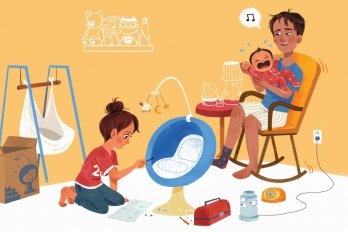The white cottage at the mouth of the Go Home River was the first summer place I ever rented on Georgian Bay. I was in my early forties, the breaking point in a man’s life, and the cottage satisfied several requirements: it was spare, beautiful, and on a lively and changeable body of water. The bay reminded me of the Atlantic shore on Cape Ann, north of Boston, where I grew up with my brothers and sisters. It was also secluded: the only way to get to the cottage was a two-and-a-half-hour drive followed by a serious forty-minute boat ride over open water. My wife and I had a young family and felt like we had found our place, a place just for us and for anyone who wanted to be with us.
And while it was remote, and far away from doctors, which we, strictly speaking, ought to have been closer to, especially after Walker came along—he had been born disabled with a shockingly rare genetic syndrome that had turned our lives inside out—it was also a place where Walker could be who he was, free from the stares and expectations of others. As could the rest of us. The light and the wind seemed to change my son, calm him down, and also inspire my daughter. Hayley made bead curtains and read to herself and to us, and she learned to swim. (I have a picture of that moment in my bedroom. It’s my favourite of all I own: Hayley standing to her waist in the water, hands on her hips, her elation expanding as she realizes what she has just accomplished. My wife says it is an image she wants to keep in her mind when it is her time to leave the world.) Hayley and I also did a lot of painting, if you could call it that, out on the flat granite Canadian Shield slabs that tumbled down from the white cottage to the water: we’d sit on the point with our watercolours, with Walker in his travelling crib, and we’d sketch and swim, sketch and swim. It makes me cry to remember it—not because that time is gone but because we experienced its astonishing peace and privacy and pleasure together, full of hope.
It was also the last place we vacationed before I took on a brace of full-time jobs at the CBC and the Globe and Mail to make more money, before the world consumed us. In 1998, the first summer we rented the cottage, Hayley was five and Walker was two. That was the year a developmental pediatrician revealed how delayed Walker actually was. He told us Walker would never read or drive a car. Then he asked if had any questions. I replied by explaining how Walker changed when we went up there to the island, how he seemed to lift his head toward the light and the breeze in the west and settle. I asked if I would ever be able to explain to Walker how much that place meant to me.
“Not rationally, no,” the doctor replied. “But it sounds as if he already understands it anyway, in his being. You know what the Buddhists say: get out of the way of your own mind. In that way, Walker’s miles ahead of all of us.”
It was also at the white cottage on the island, amid all that beauty and nature and stillness, that Hayley and I first forged our relationship, our closeness. I think of the island and the cottage and the sleeping cabins and the water and the bent trees and the rocks, all of it, as this incredibly deep and meaningful place because of her, full of all the grace of the world. Everything was an adventure: the blueberry picking, the possibility of snakes, the bears, the slithery cold of the water. I could think about all that forever. It still calms me down when I do.





